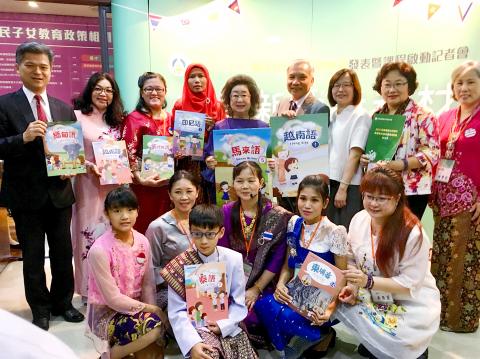Teachers and materials in seven Southeast Asian languages are to be provided for students nationwide, demonstrating that Taiwan is a multicultural and multiethnic nation, the Ministry of Education said yesterday.
It is an “important day in history” that sets a new milestone for the nation’s education policy, Deputy Minister of Education Fan Sun-lu (范巽綠) told a news conference.
There are to be a total of 126 books in Vietnamese, Indonesian, Thai, Burmese, Cambodian, Malay and Filipino, with 2,328 people certified to teach the courses, Fan said.

Photo: Rachel Lin, Taipei Times
Giving students an opportunity to learn Southeast Asian languages will familiarize them with the concept of a multilingual, multiethnic and multicultural society, she added.
Starting in August, when the next semester begins, there is to be one period of a mandatory Southeast Asian language course in elementary schools each week, an optional course based on whether there are enough interested students for a “flexible education” period in junior-high schools and an optional course in senior-high schools, K-12 Education Administration Director-General Peng Fu-yuan (彭富源) said.
Taiwan is the first nation to incorporate multiple Southeast Asian languages into official curricula and develop official textbooks for them, he said.
The textbooks would be the same nationwide and also include cultural knowledge, such as why some people wear hijabs and the significance of the adab gesture when greeting others, said Ting An-ni (丁安妮), an Indonesian-language teacher at Beixin Elementary School in New Taipei City.
Huang Pao-yun (黃寶雲), Beixin Elementary School’s Malaysian-language teacher, said she was proud that the languages of foreign spouses are now included as official courses, adding that she felt truly accepted by the Taiwanese government and people.
New Taipei City Department of Education Director Chang Ming-wen (張明文) said that the city participated in the drafting of Southeast Asian language textbooks in 2016 and has held trial courses since 2017.
The New Taipei City Government has prepared several ancillary measures to support the policy, Chang said, adding that it has endeavored to make the wording of the materials as genuine as possible.
The K-12 Education Administration, National Central University and the Institute for Information Industry have also collaborated on creating digital content for Southeast Asian language education, Peng said.
The project aims to overcome the constraints of distance and lack of educational resources in rural areas to allow schoolchildren to learn the languages in real time, he said.

The first global hotel Keys Selection by the Michelin Guide includes four hotels in Taiwan, Michelin announced yesterday. All four received the “Michelin One Key,” indicating guests are to experience a “very special stay” at any of the locations as the establishments are “a true gem with personality. Service always goes the extra mile, and the hotel provides much more than others in its price range.” Of the four hotels, three are located in Taipei and one in Taichung. In Taipei, the One Key accolades were awarded to the Capella Taipei, Kimpton Da An Taipei and Mandarin Oriental Taipei. Capella Taipei was described by

The Taichung District Court yesterday confirmed its final ruling that the marriage between teenage heir Lai (賴) and a man surnamed Hsia (夏) was legally invalid, preventing Hsia from inheriting Lai’s NT$500 million (US$16.37 million) estate. The court confirmed that Hsia chose not to appeal the civil judgement after the court handed down its ruling in June, making the decision final. In the June ruling, the court said that Lai, 18, and Hsia, 26, showed “no mutual admiration before the marriage” and that their interactions were “distant and unfamiliar.” The judge concluded that the couple lacked the “true intention of

EVA Airways today confirmed the death of a flight attendant on Saturday upon their return to Taiwan and said an internal investigation has been launched, as criticism mounted over a social media post accusing the airline of failing to offer sufficient employee protections. According to the post, the flight attendant complained of feeling sick on board a flight, but was unable to take sick leave or access medical care. The crew member allegedly did not receive assistance from the chief purser, who failed to heed their requests for medical attention or call an ambulance once the flight landed, the post said. As sick

INDUSTRY: Beijing’s latest export measures go beyond targeting the US and would likely affect any country that uses Chinese rare earths or related tech, an academic said Taiwanese industries could face significant disruption from China’s newly tightened export controls on rare earth elements, as much of Taiwan’s supply indirectly depends on Chinese materials processed in Japan, a local expert said yesterday. Kristy Hsu (徐遵慈), director of the Taiwan ASEAN Studies Center at the Chung-Hua Institution for Economic Research, said that China’s latest export measures go far beyond targeting the US and would likely affect any country that uses Chinese rare earths or related technologies. With Japan and Southeast Asian countries among those expected to be hit, Taiwan could feel the impact through its reliance on Japanese-made semi-finished products and